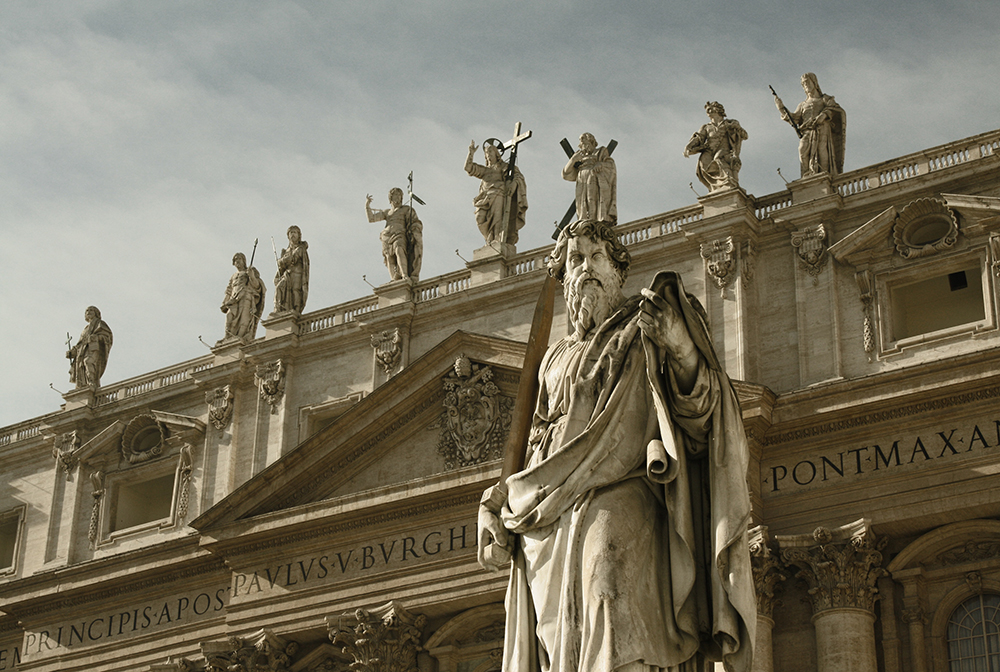Welcome to part two of the blog series Born Broken. If you have not read part one I encourage you to do so first, otherwise you may feel a bit lost. Part two examines the basic question of what the purpose and function of myth is and how the misinterpretation of the creation myth of Genesis gave birth to the concept of original sin. I also offer a radically differing interpretation known as Ancestral Sin. Again, the personal reflections speak to my state of mind at the time of writing the first draft in 2009. It get’s a bit dense at times folks, so grab a cup of tea, sit back, and prepare to go on the second leg of the journey with me . . .
Myth: True or False?
What exactly is a myth? This question is actually central to understanding how the concept of original sin came about. In our common vernacular the word “myth” has come to mean something that is false or untrue. However, the true and original meaning of myth is something of far greater importance, as it is deeply intertwined with the course of human history. Joseph Campbell, the preeminent American mythologist, writer and lecturer notes that in the original sense, a myth is not something that is false, but a form of communication that points beyond words through the use of metaphor and symbol.1 However, our collective lack of understanding around what a myth is has led to a limited ability to absorb the messages contained therein. This lack of understanding can cripple an individual’s and thus a society’s ability to learn and fully benefit from mythology. Having a deeper understanding of the function and purpose of myth, including an exploration surrounding the common errors in translation of mythology in Western society, sheds much needed light upon the origins of the concept of original sin.

The Common Error
Campbell asserts that “ . . . if you mistake the denotation of the metaphor for its connotation, you completely lose the message that is contained in the symbol.1 In other words, when we harden and literalize our understanding of metaphor (denotation), instead of holding a looser allegorical understanding that goes beyond the literal (connotation), the message that the metaphor is trying to convey is lost and the myth dies. One errs when literalizing myth because metaphor fundamentally acts as a signpost pointing toward the direct experience of a mystery. As Campbell notes, “The symbol, energized by metaphor, conveys not just an idea of the infinite but some realization of the infinite.”1
A myth arises within a culture as an attempt to guide one towards a deeper and more direct understanding, an understanding that is beyond the words.
Discovering the Garden
In the creation myth found in Genesis we first find Adam and Eve in the Garden of Eden. What does the Garden symbolize? If we steer away from the literal and the idea that it is a historical place on earth, we are free to absorb the metaphor; a symbol of wholeness and of unity without division. When the Garden of Eden becomes a literal place from which humanity has been exiled instead of a metaphor for an original condition of wholeness, the meaning of this creation myth is distorted. In Genesis chapter one we find the following passage:
Then God said, “Let us make man in our image, after our likeness . . . God created man in his own image, in the image of God he created him; male and female he created them. And God blessed them . . . And God saw everything that he had made, and behold, it was very good. (27, 31)
This image of original goodness begs the question, if we are originally good how then can we also be originally bad, as the doctrine of original sin suggests? Given the passage above, it appears as if original sin is actually not our original condition, something which begins to emerge when an allegorical stance toward mythology is maintained.

To Miss the Mark: St. Augustine and the Birth of Original Sin
The literal meaning of the Latin word sin is “to miss the mark.” There is compelling evidence that St. Augustine, the creator of the doctrine of original sin, ironically “missed the mark” in his interpretation of Genesis.2 It may come as a surprise to many that original sin, as a popularized and pervasive term, did not exist until St. Augustine coined it in the early 5th century. Prior to Augustine, the Fathers of the early church used completely different terminology that when reexamined today appears in striking contrast to St. Augustine’s interpretation.2
Just where did St. Augustine get the ideas for original sin? Strangely enough, by his own admission he “ . . . did not properly learn to read Greek” and thus several mistranslations from Greek into Latin seems to have had profound influence in the birth of original sin.2 This possible misinterpretation of important scriptural references and its ramifications is exemplified in Augustine’s translation of Romans 5:12. In Latin the Greek idiom eph ho, which actually means because of, was translated by St. Augustine as “in whom.” 2 This is an important distinction because saying that “all have sinned in Adam” is quite different than saying that “all sinned because of him.” Partially because of this error and his own self-critical lense, St. Augustine believed and taught that all humanity has sinned in Adam.3 Reverend Antony Hughes, a former Harvard University Chaplain, and rector of St. Mary’s Orthodox Church in Cambridge, explains, “The result [of Augustine’s interpretation] is that guilt is the inheritance . . . Therefore the term original sin conveys the belief that Adam and Eve’s sin is the first and universal transgression in which all humanity participates.”2
It may be shocking and hard to believe that a mark missed by one man over 1500 years ago has given birth to such a long lasting, wildly influential, and psychologically damaging belief structure, but it has. I see the fragments of the sin of Augustine everywhere, including within my own psyche.

The Shadow Within: An Encounter with Original Sin
My personal narrative at age 23 sheds some light in the impacts of a culture steeped in original sin. It went something like this:
“Maybe I am just an asshole, through and through, that would be easier? There would at least be a freedom in that.” The idea has always been there, floating around in the back of my mind, but right now as I sit in the pain and aguish surrounding the aftermath of betraying my best friend, it seems to be quite compelling.
Weeks pass, the initial shock recedes, and I begin to find a real sense of sadness and regret. We begin to make an effort to heal the wounds, and I am remembering that I have had undeniable experiences of who I truly am at the core of my being. I begin to realize that I have felt dry and barren, starved for love though love is all around me, for at least the past two years, ever since my first love and I parted ways and my mother became ill. But if I’m an asshole how can I be worthy of this love? I have to take it, grab it, whenever I find some. “Oh there you are again, the inner asshole, a part of my shadow, I know you, I’ve been here before. Because of my belief in your reality and my over identification with you, I don’t let the love in and I feel I have to take it wherever I can by whatever means possible. If I am you and you are bad then I don’t deserve the love. Perhaps, you are actually just a part of me who, like me, has needs that are not being met. Perhaps you are trying to help me survive but you are starved for love and don’t know how to let it in either. How do I hold you? With rage or gentleness? What part of you is actually real?
Now, several years and many long talks and meditations later, I am able to see just how much has happened since then. We’ve all grown so much. I am in a strange way grateful for the whole journey, chaos and all; grateful that it was we, who love each other so much, who went threw it together. I am hyper aware of this hungry part within that believes it has to take what it needs and the judgments that breed the unworthiness. I continue to expose the ignorance and distortion contained within it and it continues to loosen its grip, little by little. I am amazed by how much good has come from something that was so horribly painful and exposed such darkness and harsh judgments, but it did, it’s the craziest thing.
Ancestral Sin: An Act of Compassion
In speaking about Adam and Eve’s Fall from grace, the Greek Orthodox Fathers used the term Ancestral Sin, which offers a radically alternative interpretation to that of Augustine’s original sin.1 Ancestral sin also significantly predates original sin and contains ideas that directly oppose those of St. Augustine and subsequent Christian reformation interpretations.
Though any collective interpretation of mythology is open to distortion, an interpretation which offers ideas that differ from that of the societal norm and steer away from the literal can serve to loosen the bonds of solidification. The ancient Eastern orthodox interpretation of The Fall within Genesis, contained within the concept of ancestral sin, is one such example that may just land closer to the original intention of this creation myth. Because of this, ancestral sin contains the potential to affect fundamental positive change within both the secular and religious hearts and minds of the West. Let’s take a deeper look.

Guilt or Choice?
In contrast to original sin, ancestral sin places full responsibility on Adam and Eve, thus limiting and localizing its effects in time. Hughes explains that, “The Eastern Church, unlike the Western counterpart, never speaks of guilt being passed from Adam and Eve to their progeny, as did Augustine. Instead, it is posited that each person bears the guilt of his or her own sin.”1 In other words, when we miss the mark and turn away from our true nature we reap the consequences in the form of suffering, much like the notion of cause and effect, or karma, found in Hinduism.
The Orthodox Fathers did, however, believe that we inherited something from the actions of Adam and Eve, but it was not guilt. Instead, we have inherited our mortality from the decision to turn away from God and leave the eternal realm of oneness and unity.1 We have inherited an impermanent and ephemeral world of opposites; a world of duality in which we must find our way back to that oneness when we are ready. However, our essential nature remains innocent and fundamentally good.
In addition to mortality, ancestral sin suggests that we have also inherited freedom of choice. Christianos Yannaras, a Greek philosopher, Eastern Orthodox theologian, and Professor Emeritus of Philosophy at the Panteion University of Social and Political Sciences, Athens asserts that, “Adam and Eve failed to obey the commandment not to eat from the forbidden tree thus rejecting God and their vocation to realize the fullness of human existence.”4 It is this turning away from God which constitutes the original act of missing the mark.
The doctrine of ancestral sin suggest that we have inherited the free will to choose to either move towards the fullness of our human potential i.e. –God/wholeness—or away from it.
Within ancestral sin, God is looked at in an entirely different light than that of the paradoxically vengeful and wrathful God of the Old Testament. In clear contrast to original sin, God’s decision to cast Adam and Eve from the Garden of Eden is seen as an act of compassion and not of punishment. This is a radical shift in thinking. Hughes writes that:
In Orthodox thought God did not threaten Adam and Eve with punishment nor was He angered or offended by their sin; He was moved to compassion. The expulsion from the Garden and from the Tree of Life was an act of love and not vengeance so that humanity would not ‘become immortal in sin.1
According to the transpersonal philosopher and writer Ken Wilber, when Adam and Eve ate from the Tree of Knowledge of Good and Evil, duality emerged in human consciousness and boundaries were formed between self and other.5 Within the view of ancestral sin, God in his/her unlimited compassion could not allow humanity to remain in a state of duality for eternity, and thus created a world of opposites, a world of good and bad, right and wrong, you and me, etc, for humanity to dwell in and explore. This was the original separation from God/Unity, which created the ability to choose and the illusion of separateness. There is no trace of punishment within the ancient doctrine of ancestral sin. We have done nothing wrong. Our so-called “transgressions” are born out of a fundamental innocence and goodness. Can you even imagine how different a Western world it would be if ancestral sin would have taken root?

Despite the existence of this ancient doctrine which frees people of their “innate” guilt, original sin won out and so we are still bombarded and haunted by images from the old testament of an angry vengeful God. This creates in one’s mind a sense of basic insecurity and guilt.1 There is a fear deep down in our collective unconscious that God is still angry and must be appeased, like an angry parent.1 The doctrine of original sin serves to alive the guilt we feel from having done something wrong, i.e.–being born in sin–and for which we must be punished and atone. However, imagine if those who now subscribe to a tradition preaching original sin could hear the message of ancestral sin, a message with religions origins that states that there is no inheritance of guilt and that there is no need to prove one’s worth or repent for any original state of sin. Perhaps then it would be possible for so many to begin to open and step out of the cage they condemn themselves to. How does one do this?
Ancestral sin would suggest that in order to open the cell door you must first begin to feel and trust the goodness of your own being and allow the warm rays of love that have always been shining, but for which they have presumed yourself unworthy of, to begin to melt the through the iron bars of self-condemnation.
Share the Good News
If you know someone who suffers directly from the psycho-side effects of original sin such as guilt, shame, and self-judgment, I encourage you to gently offer the notion of ancestral sin as an alternative. Counseling is also an effective means of support in uprooting some of the deeply held beliefs associated with original sin, which I will delve into in part 4. And, if you are interested in understanding how someone with no religious affiliation could still suffer from the impact of original sin, please stay tuned for part three where I trace the steps of original sin through time and into the secular psyche of the West.
Thank you for reading.
Next Time on Born Broken (Part 3) . . .
The Protestant Work Ethic: A Superhighway of Sin
References
- Campbell, J. (2001). Thou Art That: Transforming religious metaphor. Novato, California: New World Press.
- Hughes, A. (2004). Ancestral Sin Vs. Original Sin: An overview with implications for psychotherapy. Journal of Psychology and Christianity, Vol. 23. Issue. 3, pp. 271-277. Retrieved February 4, 2009, from PsychARTICLES.
- Meyendorff, J. (1978). Living Tradition: Orthodox witness in the contemporary world. Yonkers, New York: St. Vladimir s Seminary Press.
- Yannaras, C. (1984). The Freedom of Morality. Yonkers, New York: St. Vladimir’s Seminary Press.
- Wilber, K. (1979). No Boundary: Easter and Western approaches to personal growth. Boulder: Shambhala Publications.
photo credit: `James Wheeler You Choose Your Path via photopin (license)

